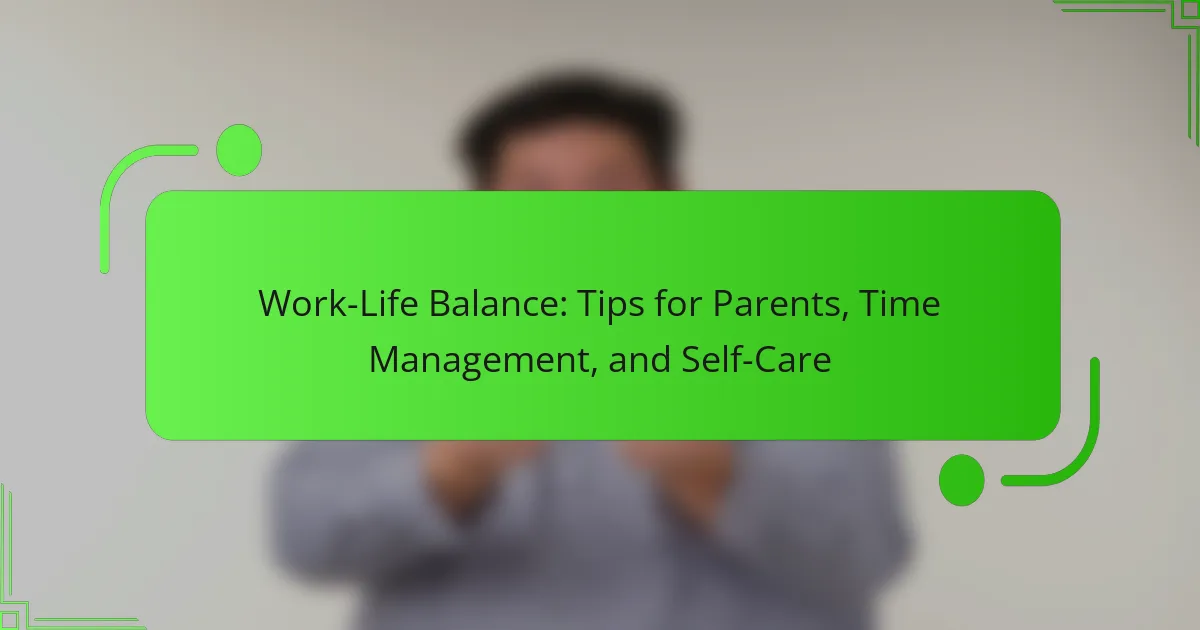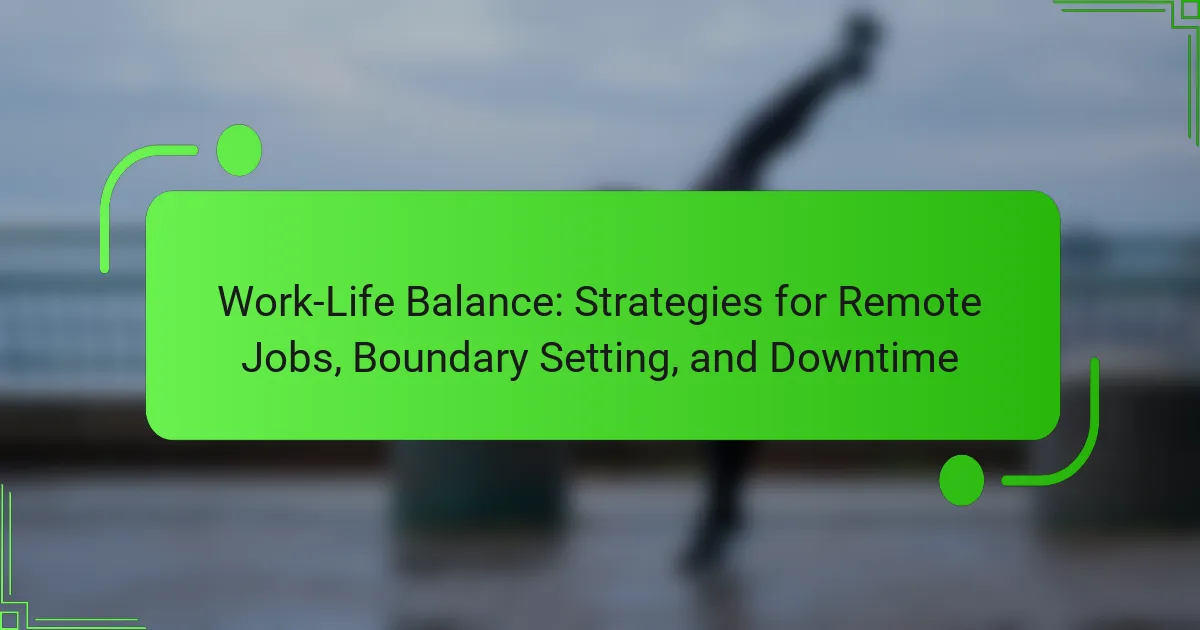Achieving a healthy work-life balance is crucial for parents navigating the demands of both their careers and family life. By implementing flexible work options, setting clear boundaries, and prioritizing self-care, parents can effectively manage their time while ensuring their personal and family needs are met. Embracing effective time management strategies and utilizing available resources can lead to a more harmonious and fulfilling life both at work and at home.

How can parents achieve work-life balance in major cities?
Parents in major cities can achieve work-life balance by leveraging flexible work options, setting clear boundaries, and utilizing available local resources. These strategies help manage time effectively while ensuring personal and family needs are met.
Flexible work arrangements
Flexible work arrangements, such as remote work or adjustable hours, allow parents to tailor their schedules to better fit family commitments. Many companies now offer options like telecommuting or compressed workweeks, which can significantly reduce commuting time and increase family interaction.
When considering flexible arrangements, assess your job’s requirements and discuss potential options with your employer. Aim for a setup that maintains productivity while accommodating your family’s needs.
Setting boundaries
Setting clear boundaries between work and personal life is crucial for maintaining balance. This can include designating specific work hours and creating a dedicated workspace at home to minimize distractions.
Communicate these boundaries to colleagues and family members to ensure everyone respects your time. Avoid checking work emails or taking calls during family time to reinforce these limits.
Utilizing local resources
Major cities often provide various resources that can help parents manage their responsibilities. This includes childcare facilities, after-school programs, and community centers that offer activities for children.
Research local options and consider enrolling your children in programs that align with your work schedule. Many cities also have parenting workshops and support groups that can provide valuable advice and networking opportunities.
Community support networks
Building a community support network can greatly enhance work-life balance for parents. Connecting with other parents can provide emotional support and practical assistance, such as carpooling or sharing childcare duties.
Look for local parenting groups, online forums, or social media communities where you can share experiences and resources. Engaging with others in similar situations can alleviate stress and foster a sense of belonging.
Time blocking techniques
Time blocking is a powerful technique that involves scheduling specific blocks of time for different tasks throughout the day. This method helps parents allocate time for work, family, and self-care without overlap.
To implement time blocking, create a daily or weekly schedule that includes dedicated time slots for work tasks, family activities, and personal time. Stick to these blocks as closely as possible to maintain focus and productivity.

What time management strategies work best for parents?
Effective time management strategies for parents focus on maximizing productivity while ensuring quality family time. By prioritizing tasks, utilizing digital tools, and creating a family calendar, parents can better balance their responsibilities.
Prioritizing tasks
Prioritizing tasks involves identifying what is most important and urgent in your daily routine. Start by listing all your responsibilities and categorizing them into high, medium, and low priority. This helps in focusing on critical tasks first, which can reduce stress and enhance efficiency.
Consider using the Eisenhower Matrix to distinguish between urgent and important tasks. This method allows you to delegate or eliminate less critical activities, freeing up time for family and self-care.
Using digital tools like Trello
Digital tools like Trello can streamline task management by providing a visual overview of your responsibilities. You can create boards for different aspects of your life, such as work, home, and family activities, making it easier to track progress and deadlines.
Utilizing Trello’s features, such as checklists and due dates, can help you stay organized. Additionally, syncing with other family members allows for collaborative planning, ensuring everyone is on the same page.
Creating a family calendar
A family calendar is essential for coordinating schedules and activities. Choose a format that works for your family, whether a shared digital calendar or a physical one in a common area. This visibility helps everyone stay informed about important dates and commitments.
Include all family members’ activities, appointments, and events in the calendar. Regularly review and update it together to ensure everyone is aware of upcoming obligations, which can minimize conflicts and enhance family cohesion.

How can self-care improve work-life balance?
Self-care is essential for enhancing work-life balance as it helps parents recharge and manage stress effectively. By prioritizing personal well-being, individuals can improve their focus, productivity, and overall happiness, leading to a more harmonious life at work and home.
Regular exercise routines
Incorporating regular exercise into your schedule can significantly boost your energy levels and mood. Aim for at least 150 minutes of moderate aerobic activity each week, which can include brisk walking, cycling, or swimming. Short sessions of physical activity, even as little as 10 minutes, can be beneficial and easier to fit into a busy day.
Consider family-friendly activities such as weekend hikes or bike rides to combine quality time with fitness. This not only promotes physical health but also strengthens family bonds, making exercise a shared priority.
Mindfulness practices
Mindfulness practices, such as meditation or deep-breathing exercises, can help reduce stress and improve mental clarity. Even dedicating just 5-10 minutes a day to mindfulness can lead to noticeable improvements in your emotional well-being. Apps like Headspace or Calm can guide you through simple routines that fit into your daily life.
Incorporating mindfulness into family activities, such as mindful eating or nature walks, can also teach children valuable skills for managing their own stress and emotions. This creates a supportive environment for everyone to thrive.
Engaging in hobbies
Engaging in hobbies is a vital aspect of self-care that can enhance work-life balance. Whether it’s painting, gardening, or playing a musical instrument, dedicating time to activities you enjoy can provide a much-needed escape from daily responsibilities. Aim to set aside at least a few hours each week for these pursuits.
Consider involving your children in your hobbies or exploring new ones together. This not only nurtures your interests but also fosters creativity and connection within the family, making leisure time more fulfilling.

What are the common challenges parents face in balancing work and life?
Parents often struggle with various challenges that hinder their ability to effectively balance work and personal life. Key issues include time constraints, feelings of guilt and stress, and a lack of support from family or employers.
Time constraints
Time constraints are a significant hurdle for parents trying to juggle work responsibilities and family obligations. Many parents find themselves stretched thin, managing work hours alongside school schedules, extracurricular activities, and household chores.
To navigate these time limitations, parents can prioritize tasks using a simple system like the Eisenhower Matrix, which helps distinguish between urgent and important activities. Setting specific time blocks for work and family can also create a more structured routine.
Guilt and stress
Feelings of guilt and stress are common among parents who feel they are not meeting the demands of either their job or their family. This emotional burden can lead to burnout and decreased productivity in both areas.
To combat guilt, parents should practice self-compassion and recognize that perfection is unattainable. Mindfulness techniques, such as meditation or deep-breathing exercises, can help reduce stress levels and promote a healthier mindset.
Lack of support
A lack of support can exacerbate the challenges parents face in achieving work-life balance. This may stem from insufficient assistance from partners, family members, or even workplace policies that do not accommodate parental needs.
Building a support network is crucial. Parents can seek help from friends, family, or community resources, and advocate for flexible work arrangements that allow for better integration of family life. Employers should be encouraged to implement family-friendly policies, such as remote work options or parental leave, to foster a supportive environment.

How can technology help parents manage their time?
Technology can significantly assist parents in managing their time by providing tools that streamline tasks, enhance organization, and facilitate communication. With the right apps and online resources, parents can better allocate their time between work and family responsibilities.
Productivity apps
Productivity apps are essential for parents looking to optimize their time management. Tools like Todoist, Trello, or Google Calendar help in organizing tasks, setting reminders, and tracking deadlines. These apps often allow for collaboration, making it easier to share responsibilities with partners or older children.
When choosing a productivity app, consider features that suit your lifestyle. For instance, if you juggle multiple schedules, an app with shared calendars can be beneficial. Aim for apps that offer user-friendly interfaces and integration with other tools you already use.
Online parenting communities
Online parenting communities provide valuable support and resources for time management. Platforms like Facebook groups or forums such as BabyCenter allow parents to share tips, experiences, and advice on balancing work and family life. Engaging with these communities can lead to discovering new strategies for efficiency.
Participating in these groups can also help you feel less isolated. Look for communities that align with your parenting style or challenges, such as working parents or single parents. Regularly interacting with these groups can provide fresh insights and encouragement to manage your time effectively.

What criteria should parents consider when choosing work-from-home options?
Parents should consider flexibility, company culture, and support systems when selecting work-from-home options. These factors can significantly impact their ability to balance professional responsibilities with family needs.
Company culture
The company culture plays a crucial role in how well parents can manage work-from-home arrangements. A supportive culture that values work-life balance can make it easier for parents to juggle their responsibilities. Look for organizations that promote flexibility, understanding, and open communication.
When evaluating company culture, consider whether the organization offers resources like parental leave, childcare assistance, or mental health support. These benefits can enhance your ability to work effectively from home while caring for your family.
Additionally, assess how the company communicates its values. Regular check-ins, employee feedback opportunities, and recognition programs can indicate a culture that prioritizes employee well-being, making it a better fit for parents.



